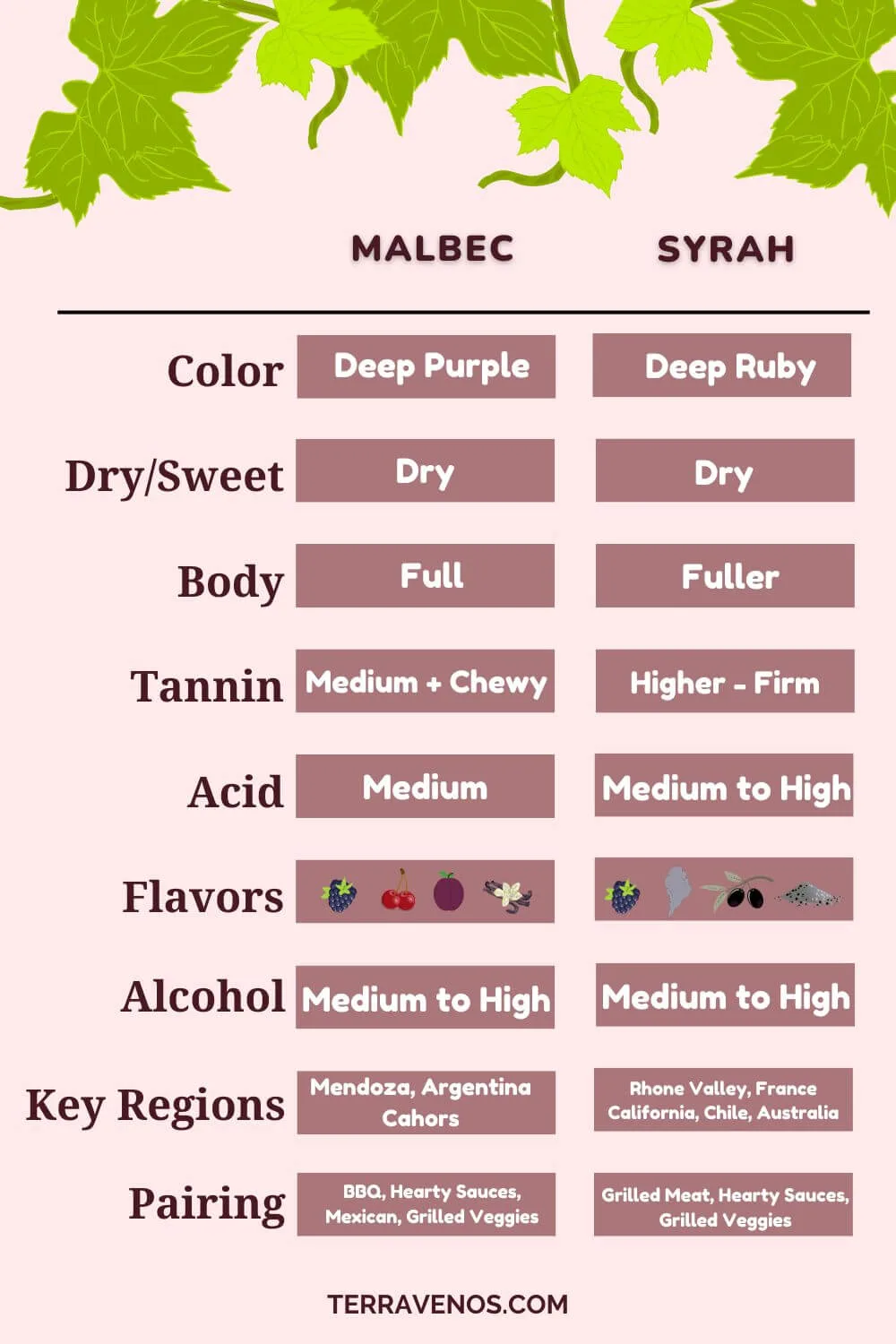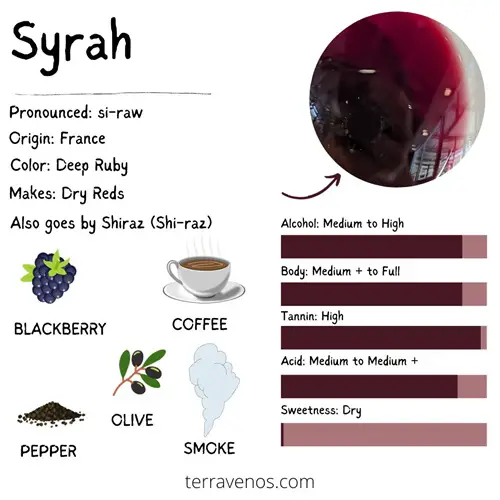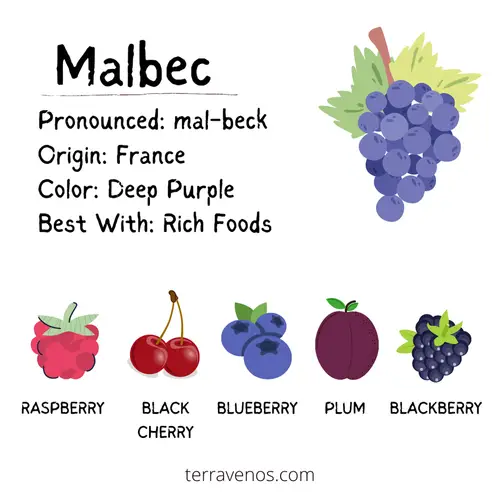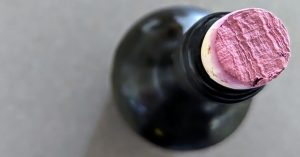
When it comes to red wines, many can taste similar unless you know what you’re looking for, like Syrah vs Malbec.
Syrah showcases a bold body and robust flavors of dark fruits and pepper compared to Malbec. Malbec offers a medium to full body, rich flavor, and often a plush texture. You can find decent Malbec and Syrah for around $15-$20 USD.
These wines provide an intriguing opportunity for new red wine enthusiasts to compare and appreciate their distinct flavor profiles, origins, and characteristics.
Syrah Basics: A Powerful Red

Syrah, originating from France, has gained international popularity due to its bold and versatile nature. Today closely connected to renowned winegrowing regions like Rhône Valley and Shiraz in Australia, Syrah presents a robust flavor profile with intense fruit notes and a hint of spice. It is renowned for its bold body, offering a powerful and complex drinking experience. (Here’s a deep dive into Syrah wines.)
Fun Wine Fact: Syrah is known as Shiraz in Australia. Despite the different names, both refer to the same grape variety.
Being one of the world’s top Syrah producers, France makes Syrah at various price points, making it a versatile wine for different occasions. You’ll also find higher-end selections crafted by renowned producers that exhibit more expressiveness and depth on the palate.
Let price be your guide.
Helpful Tip: If you’re new to wine tasting, here’s a quick guide to help you navigate unfamiliar wines.
Malbec Basics: Argentine Elegance

Malbec, a true Argentine wine, offers an accessible red wine for all tables.
With origins in France, it found its true home in Argentina. Malbec showcases a distinct character with bold fruit flavors and a lush mouthfeel. Malbec’s full body and flavors of ripe blackberries and plum pair well with grilled meats and hearty dishes.
Malbec is known for its medium to full body, providing a substantial weight on the palate. Its flavor profile includes dark fruits, cocoa, and sometimes a hint of vanilla, reflecting its unique terroir.
Fun Wine Fact: Malbec gained significant popularity when it was introduced to Argentina in the 19th century. Today, Malbec has gained recognition beyond its Argentine origins, with vineyards in regions such as France, the United States, and Australia.
Wine Comparison: Syrah vs. Malbec
Here’s a quick side-by-side that covers the most common styles of Syrah and Malbec.
| Characteristics | Syrah | Malbec |
|---|---|---|
| Hue | Deep purple to black | Deep violet to black |
| Color | Red | Red to purple |
| Aromas | Dark fruits, black pepper, smoke | Plum, black cherry, cocoa |
| Tannins | High | Medium to high |
| Acid | Moderate | Moderate |
| Alcohol (%) | 13.5-15% | 13-15% |
| Body | Full | Medium to full |
| Intensity | High | Medium to high |
| Key Growing Regions | Rhône Valley, Australia, California | Mendoza, Argentina, Cahors |
| Classic Pairings | Grilled meats, game, spicy dishes | Steak, barbecue, roasted meats |
| Price Range | $15-$40 | $10-$30 |
Syrah Wine Profile
- Sweetness: Syrah is typically produced in a dry style, offering minimal residual sugar.
- Alcohol: Syrah wines generally have a moderate to high alcohol content, ranging from around 13% to 15% ABV.
- Body: Known for its bold body, Syrah provides a powerful and complex drinking experience.
- Tannins: Syrah often has higher tannin levels compared to Malbec.
- Acid: Syrah usually has medium acid, similar to Malbec.
- Flavor and Aroma Intensity: Syrah exhibits robust flavors and aromas, with intense dark fruit notes and hints of spice.
- Flavors: The flavor profile often includes blackberry, black pepper, dark chocolate, and sometimes a touch of smoked meat or leather.

Malbec Wine Profile
- Sweetness: Malbec wines lean towards dryness, offering a range of dry to off-dry styles.
- Alcohol: Malbec wines typically have a moderate to high alcohol content, similar to Syrah, ranging from around 13% to 15% ABV.
- Body: Malbec is known for its medium to full body.
- Acid: Malbec usually has medium acid, about the same as Syrah.
- Tannins: Malbec showcases moderate tannin levels.
- Flavor and Aroma Intensity: Malbec boasts intense dark fruit notes and a plush mouthfeel.
- Flavors: The flavor profile often includes blackberry, blueberry, plum, cocoa, and sometimes a hint of vanilla.
Are Syrah and Malbec Similar?
Both Syrah and Malbec are rich red wines that have dark fruit flavors. Both wines are often oaked, with mocha, coffee, and chocolate notes. If you like Syrah or Malbec, you’re likely to enjoy the other wine, too.
What Is the Difference Between Syrah and Malbec?
Syrah tends to have a bolder body, compared to Malbec’s medium to full body. Syrah often exhibits peppery and spicy flavors, while Malbec leans towards ripe dark fruit notes. Additionally, Syrah has higher tannin levels.
Syrah vs. Malbec: Food Pairings and Serving Temperature

- Syrah Food Pairing: Syrah’s bold dark fruit flavors and spice make it a versatile companion for a variety of dishes, including grilled meats, stews, and spicy cuisine.
- Malbec Food Pairing: Malbec, with its plush mouthfeel and ripe fruit notes, pairs exceptionally well with grilled steaks, roasted vegetables, and barbecued ribs.
Personal Note: I love both Syrah and Malbec with a spicy barbecue and grilled vegetables.
Both Syrah and Malbec are best enjoyed at slightly below room temperature. Place them in a cool, dark place for a while before serving.
Discover:
Syrah Cheese Pairing Guide
Red Wine and Cheese Pairing Guide
Which Is More Expensive, Syrah vs. Malbec?

When comparing the prices of Syrah and Malbec, it’s natural to wonder about their relative costs.
Syrah Cost
Entry-level Syrah wines are typically affordable, ranging from $10 to $20 per bottle. If wine affordability is something you’re thinking about, Syrah is an accessible choice.
If you look for premium Syrah, there are higher-priced Syrah wines available. These bottles, priced around $25 to $50 or higher, offer a more complex and nuanced drinking experience.
Helpful Tip: Cote Rotie AOC, in France, has excellent Syrah wines that tend to be more premium.
Malbec Cost
Similar to Syrah, entry-level Malbec wines also fall within accessible price ranges, usually ranging from $12 to $20 per bottle. These wines are known for their rich fruit flavors that forefront the plush mouthfeel, perfect for casual sipping and pairing.
On the premium side, Malbec will have more intense fruit flavors. You’ll immediately notice just how pronounced they can be. Premium Malbec wines sourced from renowned regions can have wine prices of $25 to $40 or more.
Fun Wine Fact: Premium Malbec from Argentina is often less expensive the premium wines from France thanks to favorable exchange rates and more affordable labor costs during production. Take advantage of this factoid to find outstanding bottles of Malbec wine!
Which Is Better Syrah or Malbec?
If you enjoy bold, robust red wine with more tannin, Syrah will be better for you. If you prefer a medium to full-bodied wine with a plush, silky mouthfeel, Malbec is the better choice. If you’re on a budget, Malbec is often less expensive for the quality level.

Final Thoughts – Malbec or Syrah?
Both Syrah and Malbec present delightful red wine options with their own unique characteristics.
I’m a big fan of side-by-side tastings to tease out the different wine characteristics. A great way to get started with these two wines is to do a side-by-side comparison.
Grab 2 bottles of similarly priced Syrah and Malbec. Invite over a few friends and enjoy an evening of swirling and sipping.
Syrah showcases a bold and complex nature at a price point that makes the wine a great choice for various occasions. If you’re looking for a silkier, more approachable red wine that’s fruit-forward, then Malbec will be a fun choice.
Thirsty for More?
I’m a big believer in doing side-by-side tastings to boost your wine knowledge. Here’s how to host your own wine tasting for beginners.
Check out this post on Cabernet Sauvignon vs Merlot, another popular red wine, along with Cabernet Sauvignon vs Malbec, and Shiraz vs Merlot.
You should be able to find delicious wines at every price point. Check out this post on how to find great wines under $50.



